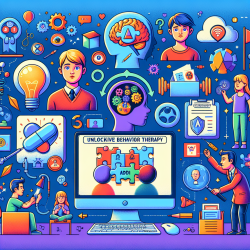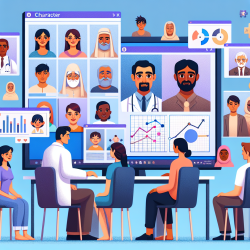As Speech Language Pathologists (SLPs) working in schools, you understand the critical role you play in helping children achieve their full potential. However, one of the biggest challenges you face is the shortage of qualified therapists. This issue not only impacts your workload but also affects the quality of care that students receive. At TinyEYE, we are committed to providing research-driven online therapy solutions that empower SLPs and ensure that every child gets the support they need.
In this blog, we will explore the benefits of online therapy, backed by research, and how it can be a game-changer for SLPs in schools. Our goal is to inform and inspire you to consider online therapy as a viable option to address speech therapy staffing shortages and improve outcomes for kids.
Why Online Therapy?
Online therapy, also known as teletherapy, has been gaining traction over the past decade. The COVID-19 pandemic accelerated its adoption, and now, more than ever, schools are recognizing its potential. But why should SLPs consider online therapy?
- Accessibility: Online therapy breaks down geographical barriers, allowing SLPs to reach students in remote or underserved areas.
- Flexibility: Teletherapy offers flexible scheduling, which can be particularly beneficial for managing caseloads and accommodating students' needs.
- Cost-Effectiveness: By reducing the need for physical space and travel, online therapy can be a more cost-effective solution for schools.
Research-Driven Solutions
At TinyEYE, we pride ourselves on being a research-driven company. Our online therapy platform is designed based on evidence-based practices and the latest research in the field of speech-language pathology. Here are some key findings that support the efficacy of online therapy:
- Comparable Outcomes: Studies have shown that online therapy can produce outcomes comparable to traditional in-person therapy. For example, a study published in the Journal of Telemedicine and Telecare found that children receiving teletherapy made similar progress to those receiving face-to-face therapy.
- Increased Engagement: Research indicates that the interactive and multimedia-rich environment of online therapy can enhance student engagement and motivation. This is particularly important for kids who may find traditional therapy settings intimidating or boring.
- Parent Involvement: Online therapy platforms often include features that facilitate parent involvement, such as session recordings and progress tracking. Engaging parents in the therapy process can lead to better outcomes for children.
How TinyEYE Supports SLPs
At TinyEYE, we understand the unique challenges faced by SLPs in schools. Our platform is designed to support you in delivering high-quality therapy while addressing staffing shortages. Here's how we can help:
- Comprehensive Training: We provide thorough training to ensure that SLPs are comfortable and proficient in using our online therapy platform.
- Technical Support: Our dedicated support team is always available to assist with any technical issues, ensuring that your sessions run smoothly.
- Resource Library: Access a vast library of resources, including therapy materials, assessment tools, and professional development opportunities.
Conclusion
Online therapy is not just a temporary solution; it is a forward-thinking approach that can revolutionize the way SLPs deliver services in schools. By leveraging research-driven practices and innovative technology, TinyEYE empowers SLPs to overcome staffing challenges and provide exceptional care to kids. We invite you to explore our platform and discover how we can support you in your mission to help children achieve their full potential.
For more information, visit our website or contact us to schedule a demo. Together, we can make a difference in the lives of children and ensure that no child is left behind.










